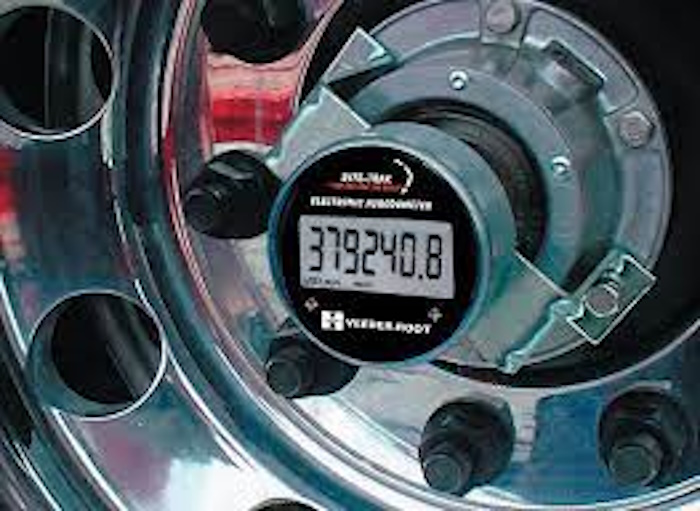Bluetooth Hubodometer for Trailer Maintenance: The Key Benefits
- Hubodometer
- Comments Off on Bluetooth Hubodometer for Trailer Maintenance: The Key Benefits
- Posted on
Introduction:
In the ever-evolving world of fleet management, staying ahead of maintenance needs is crucial for operational efficiency and cost-effectiveness. Enter the Bluetooth hubodometer for trailer – a game-changing device that’s revolutionizing how fleet operators track and maintain their assets.
This innovative tool, mounted directly on trailer hubs, offers a wealth of real-time data that can significantly enhance maintenance strategies. By leveraging the power of Bluetooth technology, these hubodometers provide accurate, accessible information that’s transforming trailer maintenance practices across the industry.
Accurate Mileage Tracking: The Foundation of Proactive Maintenance
One of the primary advantages of using a Bluetooth hubodometer for trailer maintenance is its ability to provide precise, real-time mileage data. Unlike traditional odometers that may be inaccurate or easily tampered with, these advanced devices offer reliable readings that serve as the foundation for proactive maintenance strategies.
By knowing exactly how many miles a trailer has traveled, fleet managers can anticipate wear and tear on various components, preventing unexpected breakdowns and costly roadside repairs. This level of accuracy ensures that maintenance schedules are based on actual usage rather than estimates, leading to more efficient resource allocation and reduced downtime.
Optimized Maintenance Scheduling: Keeping Trailers in Peak Condition
Integrating data from a Bluetooth hubodometer for trailer maintenance allows fleet operators to create highly optimized service schedules. Instead of relying on arbitrary time intervals or rough mileage estimates, maintenance can be planned based on precise usage metrics.
This approach enables proactive servicing of components before they reach critical wear levels, extending their lifespan and avoiding costly repairs or replacements. By aligning maintenance activities with actual trailer usage, companies can strike the perfect balance between minimizing downtime and maximizing the longevity of their assets.
Tire Wear Monitoring: Extending Tread Life and Ensuring Safety
Tires represent a significant ongoing expense for trailer fleets, making their proper management essential. Bluetooth hubodometers excel in this area by providing accurate data for tracking tread wear and determining optimal rotation schedules. These devices can account for changes in tire circumference over time, ensuring that mileage calculations remain precise even as tires wear down. By leveraging this data, fleet managers can optimize tire replacement intervals, maximizing the lifespan of each set while maintaining safety standards.
This level of precision in tire management not only reduces costs but also enhances overall fleet safety by minimizing the risk of blowouts and other tire-related incidents.
Regulatory Compliance: Streamlining Reporting and Record-Keeping
For many fleet operators, compliance with regional regulations and accurate reporting of road usage is a critical concern. Bluetooth hubodometers simplify this process by providing reliable mileage data that can be used for calculating road user charges, taxes, and other levies.
The accuracy and tamper-resistant nature of these devices ensure that fleets remain compliant with regulatory requirements, avoiding potential fines or legal issues. Moreover, the digital nature of the data makes record-keeping and auditing processes more streamlined and less prone to human error.
Convenience and Accessibility: Revolutionizing Data Collection
One of the most appreciated features of Bluetooth hubodometers is the convenience they offer in accessing and managing trailer data. Through mobile apps and cloud-based platforms, fleet managers can remotely access mileage information for their entire fleet in real-time. This eliminates the need for physical inspections to gather odometer readings, saving time and reducing the potential for transcription errors.
Additionally, many Bluetooth hubodometer models offer simplified programming and calibration processes, making setup and maintenance of the devices themselves a breeze.
Conclusion:
The adoption of Bluetooth hubodometer for trailer maintenance represents a significant leap forward in fleet management technology. By providing accurate mileage tracking, enabling optimized maintenance scheduling, facilitating tire wear monitoring, ensuring regulatory compliance, and offering unprecedented convenience, these devices are transforming how fleets approach trailer maintenance.
For fleet operators looking to enhance efficiency, reduce costs, and improve overall asset management, implementing Bluetooth hubodometers is a strategic move that promises substantial returns. As the technology continues to evolve, the role of these smart devices in shaping the future of trailer maintenance is only set to grow, making them an invaluable tool for forward-thinking fleet managers.…

